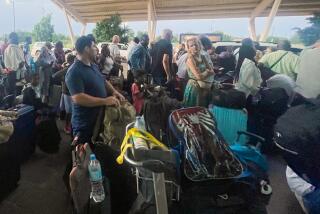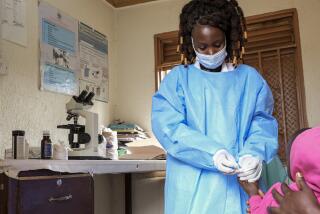Official: Ebola virus ‘extraordinarily unlikely’ to spread in U.S.
- Share via
Reporting from Atlanta — As U.S. health providers prepared for the arrival of two Americans infected with the deadly Ebola virus, international health officials warned Friday that the outbreak in Africa was oustripping their ability to control it.
The medical evacuation from Liberia to Atlanta of two stricken American citizens will occur by the end of the weekend, according to the Christian aid organization Samaritan’s Purse.
“Dr. Kent Brantly, a doctor working for Samaritan’s Purse, and Nancy Writebol, a missionary with SIM, are currently in serious condition. The two Americans who contracted Ebola in Liberia remain in the country today but medical evacuation efforts are underway and should be completed by early next week,” read a prepared statement Friday from Samaritan’s Purse.
Emory University Hospital in Atlanta confirmed Thursday that there were plans to transfer “a patient” with Ebola virus to its special containment unit within several days. The isolation units were built in cooperation with the U.S. Centers for Disease Control and Prevention.
The containment unit, which is one of only four of its kind in the nation, isolates infected patients from other areas of the hospital.
In Africa, Dr. Margaret Chan, head of the World Health Organization, told leaders of four West African countries that the international group planned to release $100 million to fight the disease that has sickened more than 1,300 people and killed 729.
“This outbreak is moving faster than our efforts to control it,” she said Friday at a meeting in the Guinean capital of Conakry. “If the situation continues to deteriorate, the consequences can be catastrophic in terms of lost lives but also severe socioeconomic disruption and a high risk of spread to other countries.”
In addition, the aid group Doctors Without Borders (MSF) said Friday that the virus was raging “out of control” in Sierra Leone and Liberia, but it has already deployed 550 health workers to Africa and doesn’t have the ability to send more help.
“The situation in Liberia is dire and there is almost no capacity on the ground to respond,” MSF spokeswoman Sandra Murillo said in a statement. “Despite the fact that the response in Liberia is not nearly adequate, MSF does not have the capacity to increase its activities in the country.”
There is no vaccine or specific treatment for Ebola, which causes fever, vomiting, diarrhea and massive internal bleeding, and has a fatality rate of 60% to 90%. It is spread through direct contact with the blood, organs or other secretions of infected people.
People who are infected with this hemorrhagic virus experience sudden fever, intense weakness, muscle pain and headaches, along with vomiting and diarrhea. The disease can also cause kidney and liver failure, as well as internal bleeding.
A hospital spokeswoman on Friday declined to answer questions on the impending arrival and referred reporters to an earlier statement.
Samaritan’s Purse said that other, noninfected workers are already in the process of departing West Africa.
“Evacuation of 60 nonessential Samaritan’s Purse and SIM staff and dependents in Liberia has already begun,” the statement said. “They are all healthy, and we expect them to return to the United States by the end of the weekend. We ask for continued prayer for the evacuation process and the health of Kent Brantly, Nancy Writebol, the medical staff treating them and for all those who are affected by Ebola.”
Word that two infected patients were being transported to the United States for medical care has sparked fears among some that the disease could begin to spread here. However, the director of the National Institute of Allergy and Infectious Diseases insisted that this was highly unlikely.
“Given the health care infrastructure and our ability to isolate people who are infected and to take care of them with the proper protective equipment, it is extraordinarily unlikely that there would be an outbreak in the United States so people should not worry,” Dr. Anthony Fauci said Friday. “It’s the lack of health care infrastructure that leads to the problems.”
Despite such reassurances, passersby at Emory University Hospital said they were uncomfortable with the idea of Ebola patients being treated in their hometown.
“What? No, that worries me,” Lisa Jackson told a reporter while sitting at a nearby bus stop. “Why are they bringing them here? They shouldn’t even let them across the border,” she said, shaking her head.
Greg Hammock disagreed but admitted he worried about the possibility of the virus spreading. “All I know is Emory better be on top of their game,” he said. “If this is the only place they can get help, then sure they should bring them here.”
Alexis Walker praised Emory and the CDC for the transfer. “It’s good to know when someone needs help and medical care, there’s someplace they can go,” Walker said. “If you can give them the care they need, why not?”
As Walker spoke, a woman drove by the hospital wearing a mask over her face. Walker said it was those kinds of sights, and social media postings warning of a deadly virus reaching American shores, that gave people the wrong idea about the situation. “What they’re doing is making people afraid,” she said.
On Thursday, the CDC issued a statement warning against travel to the West African nations of Guinea, Liberia and Sierra Leone.
“We do not have effective treatment or vaccine for Ebola,” said Dr. Tom Frieden, director of the CDC. “There is no proven treatment. There is no proven vaccine. There is not likely to be one for at least a year, even in the best case scenario. We are not going to treat or vaccinate our way out of these outbreaks.
“We are going to use the traditional means that work of case identification, isolation, contact tracing, health communication, good meticulous management. That’s what has stopped every Ebola outbreak that’s ever happened before. That’s what will stop this Ebola outbreak.”
Writebol reportedly received an “experimental serum” of which there was only enough for one person, while Brantly reportedly received a “unit of blood” from a 14-year-old boy who survived the disease, whose family wanted to thank the doctor for saving their son’s life.
Frieden said he could not comment on those reported medical interventions Thursday.
“In terms of experimental treatment, I don’t know any details of what may have been given,” Frieden said. “I will say that we have reviewed the evidence of the treatments out there and don’t find any treatment that’s had proven effectiveness against Ebola disease.”
In a news conference Friday, President Obama said U.S. officials were working to minimize any risk of Ebola spreading in this country when leaders from across Africa hold a summit next week in Washington, D.C.
Individuals leaving countries where they have a “marginal” or even “infinitesimal risk of exposure” will be screened for Ebola before departure, Obama said. Additional screening will occur once they arrive in the U.S.
“We’re taking the appropriate precautions,” Obama said. “We feel confident that the procedures we put in place are appropriate.”
Frieden said Thursday that CDC officials were working with several agencies “to ensure that if there is someone who becomes ill, that they’re appropriately cared for, and that their risk of exposing others is minimized.”
Morin reported from Los Angeles, Susman from Atlanta. Christine Mai-Duc in Los Angeles and Robyn Dixon in Johannesburg, South Africa, contributed to this report.
More to Read
Sign up for Essential California
The most important California stories and recommendations in your inbox every morning.
You may occasionally receive promotional content from the Los Angeles Times.














